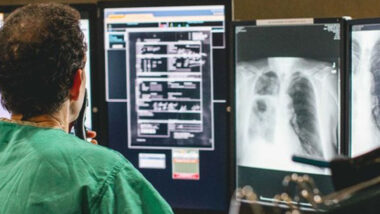While once rare, magnetic resonance imaging (MRI) scans are increasingly more common in everyday health care. MRI scans are used to diagnose the causes of a wide array of issues, such as back pain and sports injuries, as well as brain and heart conditions. Because an MRI doesn’t use radiation, these scans are also safe for pregnant women, children and others who need to avoid exposure to X-rays. Our advanced MRI scanners are operated by highly trained technologists, who are experts in MRI safety. Technologists are well-versed in manufacturer guidelines to assess safety approaches and compatibility for each patient in each exam, including those with medical implants. Rest assured, our dedicated team will guide you through the entire process, providing clear instructions and support before, during, and after your MRI, ensuring your experience is as comfortable and stress-free as possible. Your safety and peace of mind are our top priorities.
MRI Technology, Explained
An MRI scanner is an advanced technology that uses magnets and radio waves to create detailed images of internal structures in the body. This process allows for the production of cross-sectional and 3D images of organs and tissues without using ionizing radiation.
MRI scans are often used to diagnose muscle, ligament, spinal and abdominal conditions because they capture more detailed images of soft tissues inside your body than X-rays or CT scans. MRI scans are safe, but the large magnetic force fields created by this advanced technology require multiple safety precautions before, during and after each scan.
Pre-Scan Safety Measures
Because MRI scanners have very powerful magnetic fields, they can cause even tiny metal objects to fly across the room. This ability to turn even items as small as paper clips into a projectile is called the missile effect, and it can be dangerous to people in the surrounding areas and may cause damage to equipment.
Carolinas Imaging Services adheres to the safety guidelines set by the American College of Radiology for MRI safety zones. These safety zones are designed to restrict access to areas close to the MRI scanner and ensure that only individuals who have been screened for metal are allowed within the range of the magnetic field. We have implemented several safety measures before the scan to ensure your well-being.
- Changing into approved garments. We require all patients to change into facility-provided garments. Clothing with metal parts such as zippers, buttons or metallic threads can be attracted to the magnet, posing a safety risk to the patient and potentially damaging the machine. Using standardized garments helps streamline the process, making it easier and faster to prepare patients for their MRI scans.
- Removal of jewelry and piercings. Patients are also reminded to remove all jewelry and piercings to prevent any interference with medical equipment and ensure a smooth, safe and metal-free examination process.
- Screening for foreign objects and implants: We will ask you about any metallic foreign bodies, devices or implants you may have in your body. Some examples include shrapnel, certain hearing aids, insulin pumps, pacemakers and other medical devices. While not all implants are universally compatible with MRI machines, many are perfectly safe for specific types of exams and can be used with certain MRI equipment. This ensures a wide range of diagnostic options are safely accessible to those with implants.
- Removal of metallic objects: We will provide instructions for removing everything that could be a problem before you get near the MRI scanner. This includes removable medical devices, jewelry, hair clips, clothing with metallic fibers, bras, and any other metal items.
- Screening for contraindications: If you have any medical conditions or devices that may pose risks during an MRI scan, such as pacemakers or cochlear implants, we will discuss them with you prior to the scan. Many devices are MRI-safe, but some are not. It’s important to know the exact type of device you have so we can assess risk.
Read More: How to Prepare for an Upcoming MRI Exam
Safety Protocols During the Scan
During your MRI scan, we take several measures to ensure your safety.
- Communication: You can communicate with your MRI technologists throughout the procedure, which can be as fast as 15 minutes or as long as an hour, based on what exam you are there for. We encourage you to communicate any discomfort or concerns during the scan.
- Noise reduction: We have techniques to reduce the amount of noise produced by the machine during the procedure. Additionally, we ask patients to use some external means for noise reduction. We provide earplugs as an option, or you can choose to use noise-reducing headphones and listen to music during the procedure.
- Positioning: You will be positioned safely within the MRI machine to ensure safety and optimal image quality. If you have claustrophobia, please let us know so we can accommodate you.
Some patients will need contrast during their MRI, a safe solution or dye given via an IV that helps to enhance images taken throughout the scan. MRI contrast is much less likely to cause an allergic reaction than the kind used in CT scans, but in rare cases, patients may experience an adverse reaction. Please let us know about any allergies.
Post-Scan Safety Measures
After completing your MRI scan, we continue to prioritize your safety by providing you with post-scan safety measures. We will explain to you how to:
- Monitor your body for any immediate or delayed adverse reactions following the scan.
- Take steps to follow your post-scan care instructions provided by healthcare providers, including resuming normal activities and any restrictions.
It is important to promptly report any unusual symptoms or reactions to your healthcare providers during the hours after your scan.
Prioritizing MRI Safety
If your physician requires imaging for a diagnosis or to inform treatment decisions and you need to undergo an MRI, it’s understandable that you might feel nervous. Rest assured, Carolinas Imaging Services (CIS) prioritizes your safety throughout the exam and will prepare you and help you understand what to expect so that you can have peace of mind. They implement all the latest MRI safety measures before, during and after scans, so you can trust that you’re in good hands. CIS is a reliable and safe option for your MRI needs.



